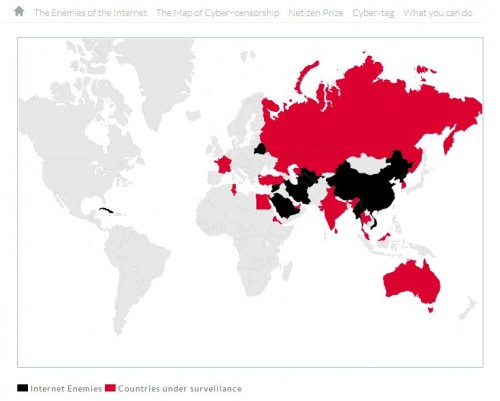Egyptian, Eritrean, Tunisian Internet still considered ‘under surveillance’
Until last year, Reporters Without Borders (RSF), the world’s leading watchdog of press freedom, had always considered at least one African nation an “Enemy of the Internet”. Fortunately, the trend has continued into 2012 – none of the twelve nations with the heaviest Internet censorship are found in Africa. Still, even a year after North African regime changes and Arab Spring, RSF has kept perennial Internet censors Egypt, Tunisia, and Eritrea in the lesser “under surveillance” category. Libya, no longer under the harsh rule of the Gaddafi regime, is finally off the list.

African nations, especially in Sub-Saharan Africa are under relatively little government surveillance. Note how France and Australia are highlighted. {RSF}
The unchanged ranking of Egypt, Tunisia, and Eritrea in 2012 comes as no surprise. Last year, we noted how Egypt and Tunisia must still eliminate the possibility for future censorship. Our guess is that Tunisia will no longer be on this list in 2013. Eritrea continues to operate under a dictatorship that greatly monitors Internet access and will most likely be “under surveillance” for years to come. In fact, Eritrea is at the bottom of the Press Freedom Index, which covers all forms of media.
Reporters Without Borders provides the reasoning behind their assessment of Internet censorship. Below are the methods of how each African nation on the list has censored its Internet in 2012.
12 enemies (0 African)
14 countries under surveillance (3 African)
Egypt:
- Detention of multiple bloggers throughout the year
- Possible limited bandwidth during legislative elections in November 2011
- Good news: most bloggers have no intention of giving up
Eritrea:
- No independent site is operated from within the nation
- Self-censorship in cyber cafes
- Government wages online offense against criticisms – including disinformation campaigns and cyber attacks against opposition sites
- Good news: Active diasporan community is able to spread information
Tunisia:
- Continued punishment of outspoken bloggers
- Freedom of the entire Internet is not covered by upcoming legislation
- Limited Internet filtering was implemented in February 2012, and although halted due to financial reasons, could presumably resume in the future
- Good news: Restructuring of the Tunisian Internet Agency to work under international practices. Liberalizing the Internet market. Fighting filtering techniques.












 Twitter
Twitter Facebook
Facebook Pinterest
Pinterest
[…] due to online activity this year have come from Djibouti and Ethiopia – nations known to have limited press freedom. In these cases, the bloggers/journalists seem to have not necessarily broken an actual law, but […]
[…] of the Internet” report from Reporters Without Borders (RSF). Their 2012 report placed Egypt, Tunisia, and Eritrea in the lesser “under surveillance” category. Also, freedom […]